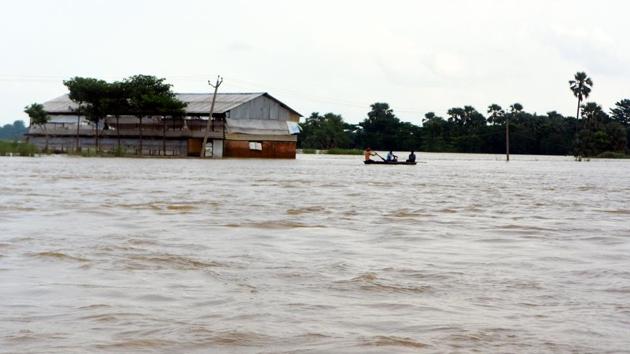Bihar floodwater recedes, miseries continue
Heavy rainfall in Nepal, where many rivers that flow into the northern plains of Bihar originate, often causes flash floods
Ganauli Jagdishpur, a village populated by the Musahar caste — a Dalit identity, many from the community who live here are rickshaw and handcart pullers — turns into an island each monsoon.

Heavy rainfall in Nepal, where many rivers that flow into the northern plains of Bihar originate, often causes flash floods. This year, Kamla river, which flows through several districts of Bihar including Darbhanga, was one of the six rivers in spate. (Bagmati, Burhi Gandak, Mahananda were among the others). And Jagdishpur, located barely two kilometres from the National Highway 57, bore the brunt of the deluge. Several homes were damaged as the floods also trapped people for days. Now, as the water has begun to recede, a trail of destruction has been left behind.
Heavy rainfall in Nepal since the second week of July, followed by heavy rainfall across north Bihar has caused at least 123 deaths, with 8.1 million people affected in 12 of the state’s 30 districts
It was July 19. Jagdishpur’s men returned home early as incessant rainfall had left them with little work in market. After they finished dinner, and were getting ready to retire, the Kamla breached its banks and began to encircle their village. Since the hamlet is on an elevated plateau, the water gushed in but did not submerge the village.
“We had taken precautions like stocking ration, medicines and plastic sheets, but we had not thought that floods will come so early,” said Ramriksh Paswan, a resident.
Those living in hutments fled with their children and took shelter in concrete buildings. “The next two days and nights were harrowing, as the floodwater kept rising. Stranded on rooftops, braving hunger and parched throats, we kept praying for the water to recede,” said Brijendra Paswan, a tractor driver, who owns a double storey building — one of the few affluent men in the village, comprising 1,700 families.
By July 22, the water began to recede, but Jagdishpur remains an island with no road connectivity. Teams from the National Disaster Response Force (NDRF) worked round the clock providing relief material and ferrying medical teams on boats to the village. HT travelled to the village with an NDRF team last week. The devastation left behind by the flooding cannot be assuaged by relief work.
People ate and rested all along the muddy stretch of the road that passes through the village, their cattle and goats by their side. Several houses had caved in and many were forced to take shelter on the road under tarpaulin sheets. None of the houses had a toilet.
Livelihood had taken a hit too, as people waited for water to recede in other parts of the district to get back to work.
“We can’t do anything to prevent this annual flood,” said Santosh Paswan. “The government won’t rehabilitate us at a better, safer place and we won’t move away from this village as there is no alternate arrangement with us.”
The state government has accorded the Musahars — in Bhojpuri, the name means ‘rat-eater’ — Maha Dalit status, which makes them eligible for various government schemes that have failed to lift the community out of poverty. Caste-based segregation of villages is rampant.
“At a time when the country celebrates the successful launch of Chandrayaan-2 [India’s second lunar exploration mission] we walk miles to fetch drinking water for at least two months every year,” said Shravan Paswan, a migrant labourer.
For long, the community has demanded a road to connect their village to the national highway. “There is no road. Hence, we cannot bring our carts and rickshaws to our village. We are compelled to park them in the market and pay parking fees daily,” said Binod Paswan.
The monsoon multiplies their miseries, even when there is no flooding. “We have to wade through water or struggle walking on the muddy roads till the silt deposited by the water gets dry. Children miss schools for weeks and sometimes months in the monsoon. Still nobody cares, perhaps because we are dalits and labourers,” said Basant Paswan, a vendor.
In 2015, the villagers had announced their decision to boycott the assembly polls as a way to draw attention to their demand. “Several administrative and panchayat leaders rushed to our village, bribed a few of our community leaders, and succeeded in changing our minds. We are not going to repeat the mistake next year when the state goes to poll,” said Dharambir Paswan, a migrant labourer.
“I am not familiar with the village you are talking about as I recently got posted here,” Block development officer (BDO) Pradip Kumar Jha said.
Circle officer Kamlesh Kumar said the roads might have got washed away in the floods, and said that the government will address the problem once the water recedes.
Get Current Updates on India News, Lok Sabha election 2024 live, Election 2024 along with Latest News and Top Headlines from India and around the world.



